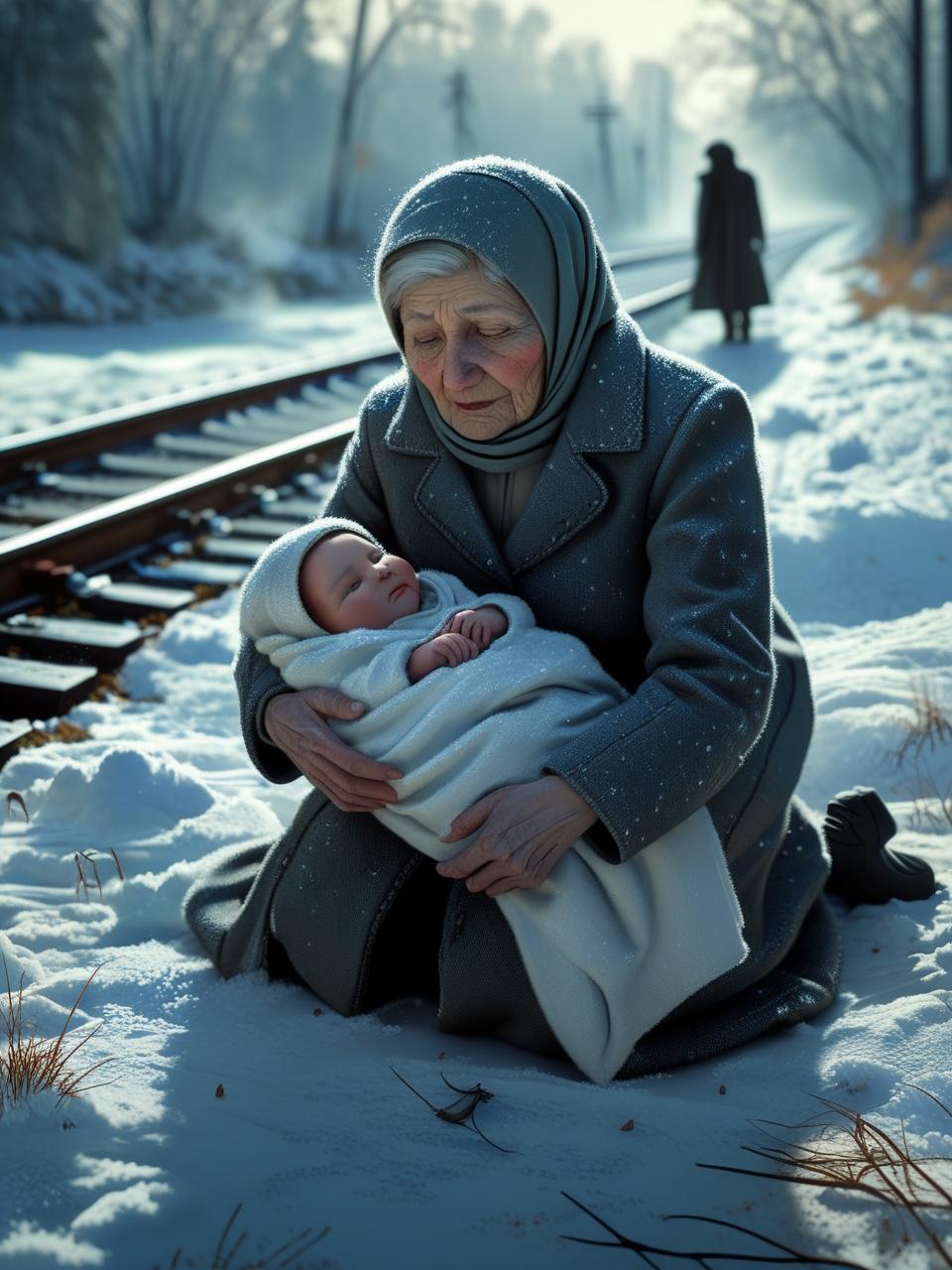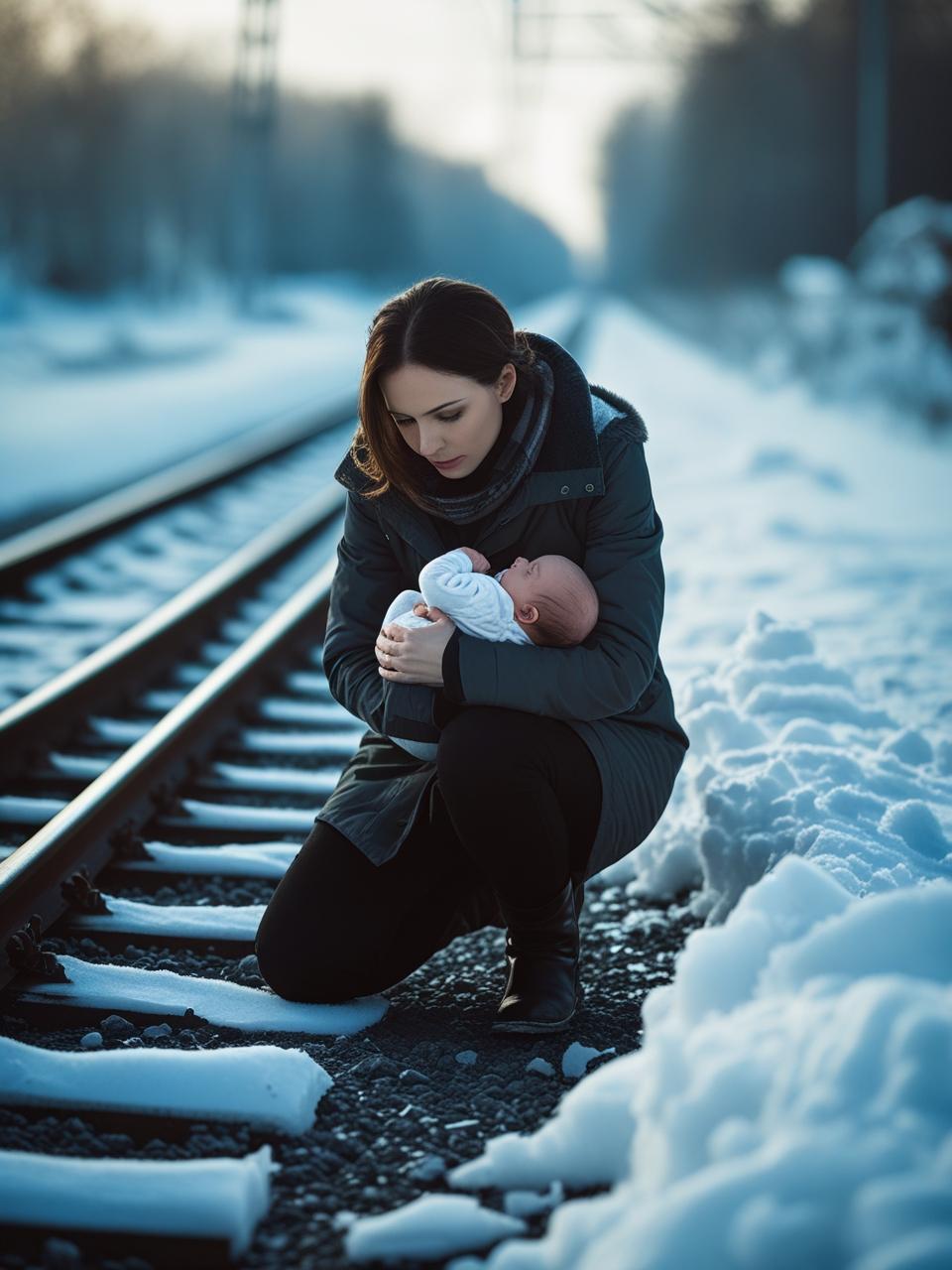My Son, My Heart: The Truth About the Baby I Found by the Tracks…
“Wait… what was that?”
I stopped dead in my tracks, halfway to the old train station, as a faint, almost ghostly sound cut through the biting February wind. The cold tugged at my coat, stinging my cheeks, but it was that soft, persistent cry—barely audible over the howling gusts—that truly chilled me.
It was coming from near the tracks, definitely. I turned towards the old, abandoned switchman’s hut, just a dark silhouette against the snow-covered landscape. And there, beside the cold steel rails, was a small, dark bundle.
My heart started thudding like a drum against my ribs. Cautiously, I stepped closer, my breath clouding in the frigid air. A threadbare, filthy blanket. And then, a tiny hand poked out—red, so red, from the cold.
“Oh my God…” I whispered, dropping to my knees.

I scooped her up. A baby. A little boy, I realized, no more than a year old, maybe even younger. His lips were blue, his skin icy. His cries were so weak, like he didn’t even have the energy to be afraid anymore. I pressed him to my chest, tearing open my coat to shield him from the brutal wind, and ran—ran as fast as my legs could carry me toward the village. Toward Mary Peterson, our only paramedic, my only hope.
“Clara, what in the world—?!” Mary gasped, taking one look at the bundle in my arms. Her face went pale.
“Found him by the tracks,” I choked out, still panting. “He was freezing.”
Mary gently took the baby, her experienced hands quickly checking him over. “He’s cold… but he’s alive. Thank God.” She reached for the phone, her fingers already dialing. “We need to tell the police.”
I stopped her, my hand firm on hers. “No, Mary. Please. They’ll just send him to an orphanage. He won’t survive the trip, not in this weather, not after what he’s been through.”
Mary hesitated, her gaze searching mine. Then, she nodded slowly, a deep understanding passing between us. She opened a cupboard. “Here. I have some baby formula left over from my granddaughter’s last visit. It’ll do for now. But Clara… what are you planning to do?”
I looked down at the little face pressed into my sweater, his breath finally warm against my skin. He had stopped crying, his tiny body starting to relax against mine. For the first time in my 35 years, my quiet, lonely house didn’t feel so empty.
“I’m going to raise him,” I said quietly, the words surprising even myself. “There’s no other way.”
My Leo, My Life
The whispers started almost immediately. “Clara’s thirty-five, never married, lives alone—now she’s picking up abandoned babies?” Let them talk. I had never cared about gossip. My heart was full, and that was all that mattered. I filed the paperwork with help from a few kind friends at the town office. They searched everywhere, but found no relatives, no missing child reports. It was like he had simply appeared out of thin air.
I named him Leo.
That first year was the hardest thing I’d ever done. Sleepless nights, endless fevers, agonizing teething. I rocked him, soothed him, sang lullabies I barely remembered from my own childhood. My hands, usually busy with books at the library, learned to change diapers, warm bottles, and comfort a crying baby.

“Ma!” he said one morning at ten months, reaching for me with tiny, chubby arms. Tears rolled down my cheeks. After all the years of loneliness—just me and my quiet little house—I was someone’s mother. And it was the most beautiful feeling in the world.
At two, he was a whirlwind. Chasing the cat, tugging at curtains, curious about everything. At three, he could recognize every letter in his picture books. By four, he was telling full, elaborate stories that made me laugh until my sides hurt.
“He’s gifted,” my neighbor Gloria said once, shaking her head in amazement. “I don’t know how you do it, Clara.”
“It’s not me,” I’d smile, my heart bursting with pride. “He’s just meant to shine.”
At five, I started hitching rides to take him to preschool in the next town over, just to give him the best start. His teachers were stunned. “Mrs. Bennett,” they told me, “Leo reads better than most of our seven-year-olds. He’s truly exceptional.”
When he started school, he wore his long chestnut braids tied with matching ribbons—I made them perfect every morning. I never missed a parent meeting, even if it meant taking an extra bus. His teachers praised him endlessly. “Mrs. Bennett,” one of them said once, “Leo is the kind of student we dream of teaching. He’s going to go far.” My chest swelled with pride. My son. My whole world.
He grew into a graceful, handsome young man. Tall, poised, with bright blue eyes full of determination. He won spelling bees, math competitions, even regional science fairs. Everyone in town knew his name, knew he was “Clara’s boy.”
Then one evening in his tenth-grade year, he came home, his eyes alight. “Mom,” he said, “I want to be a doctor.”
I blinked, a wave of fear and pride washing over me. “That’s wonderful, honey. But… university? The city? Rent? Food? How will we afford it all?”
“I’ll get a scholarship,” he said, his eyes glowing with that same fierce determination I saw in him the day I found him. “I’ll figure it out. I promise.”
And he did.
When he got his acceptance letter to the state medical college, I cried for two days straight. Tears of overwhelming joy, yes, but also a deep, aching fear. He was leaving me, for the first time. Our quiet house would be silent again.
“Don’t cry, Mom,” he said at the train station, squeezing my hand, his eyes a little misty too. “I’ll come visit every weekend.”
Of course, he didn’t. The city consumed him. Classes, labs, exams. He visited once a month at first. Then once every two or three. But he called me every evening, without fail.
“Mom! I aced anatomy!”
“Mom! We delivered a baby in clinical rotation today!”
Each time, I’d smile, listening to his stories, my heart full.
In his third year, he called with new excitement. “I met someone,” he said shyly.
His name was Josh. A fellow medical student. He came home with us one Christmas—tall, polite, with kind eyes and a quiet voice. He thanked me for the dinner and even helped clear the table without being asked.
“Good one,” I whispered to Leo as we washed dishes.
“Right?” he beamed. “And don’t worry—I’m still getting top marks.”
After graduation, he began his residency. Pediatrics, of course. “You saved me once, Mom,” he said, his voice soft. “Now I want to save other kids.”
He didn’t visit as often. I understood. He had his own life now, a demanding career. But I kept every photo he sent, every story about his little patients. They were my connection to his new world.
The Knock on the Door: A Past Revealed
Then one Thursday night, my phone rang.
“Mom… can I come tomorrow?” His voice was soft. Nervous. Not his usual cheerful self. “I need to talk to you.”
My heart thudded. “Of course, sweetheart. Are you okay?”
The next afternoon, he arrived alone. No smile. No spark in his eyes. My stomach clenched.
“What’s wrong, my love?” I asked, pulling him into a tight hug.
He sat down on the old sofa, clasped his hands tightly, and took a deep breath. “Two people came to the hospital today. A man and a woman. They were… asking about me.”
I frowned, confusion clouding my mind. “Asking what? What do you mean?”
“They said they were my aunt and uncle. That their niece went missing 25 years ago. From a train station.”
I felt my world tilt, the floor beneath me swaying. The bitter February wind, the abandoned hut, the tiny blue lips… it all flashed before my eyes. “And?” I managed, my voice barely a whisper.
“They had photos. DNA tests. Everything. It’s real, Mom.”
A long, heavy silence filled the room, broken only by the ticking of the old grandfather clock.
“They abandoned you,” I finally whispered, the words tasting like ash. “Left you by those tracks, in the snow, to die.” The anger, raw and fierce, surprised me.
“They say it wasn’t them,” Leo replied, his voice strained. “They say her parents—my parents—were fleeing an abusive situation. That they got separated at the train station. That they looked for me for years, but the records were messed up, and they had no money, no connections.”
My breath caught. “And your parents?”
“Gone,” he said, his voice flat. “Car accident ten years ago. They never stopped looking.”
I didn’t know what to say. My mind was a whirlwind of emotions—shock, anger, a strange sense of loss for the story I thought I knew.
Leo reached for my hand, his grip firm. “They don’t want anything from me, Mom. They just… they just wanted to tell me the truth. That I have cousins. That I wasn’t just… thrown away.”
I nodded slowly, tears welling in my eyes. “What do you want to do, my sweet boy?”
“I don’t know,” he whispered, his own eyes glistening. “I just… I needed to tell you. Because…” He looked at me, his gaze unwavering. “You are my mother, Mom. No matter what blood says. I found you. I raised you. I loved you every single day of your life.”
Tears spilled freely from his eyes, mirroring mine. “I know, Mom,” he choked out. “And I’m not going anywhere. You’re my mother. Forever.”
A New Chapter, A Deeper Love
A year has passed since that conversation.
Leo visits those relatives now and then. They’ve become a quiet part of his story, a new branch on his family tree. But not his heart. His heart, his home, is still with me.
He calls me every morning, without fail. Sends me photos of his little patients and silly stories from the clinic that make me laugh.
Last month, he and Josh got engaged. The wedding’s set for spring. And when he asked me to walk him down the aisle, my heart just soared.
“You saved my life, Mom,” he said, his voice thick with emotion. “And you gave me everything that came after. Every single good thing.”
And I—just a woman who once heard a tiny cry by the railroad tracks—will walk with him proudly, every step of the way. Because our love story, born of a cold February wind and a desperate hope, is the truest one of all.
Beta feature
Beta feature
Beta feature


